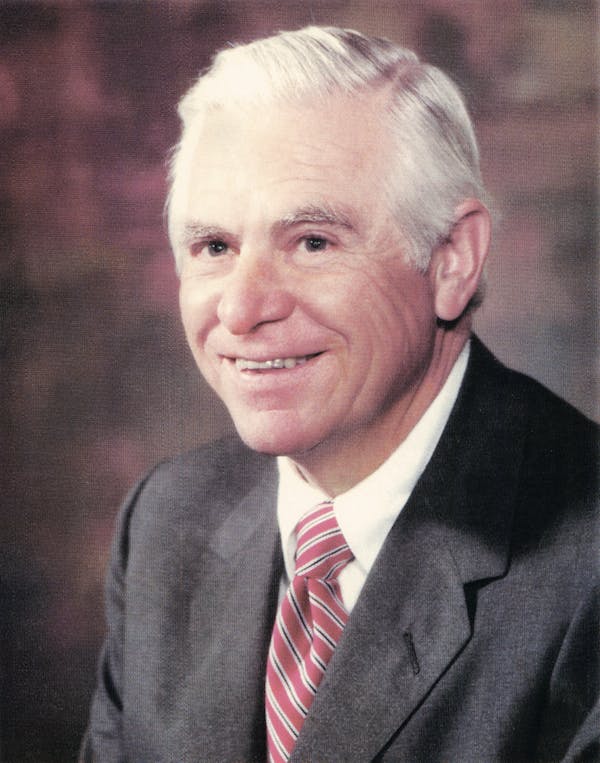
Baker, Richard T.
1998 - Ernst & Ernst
Richard T. Baker laid the groundwork for Cleveland's rebirth and helped make it a center of charitable giving. But not before trans-forming the face of accounting.
Richard Baker is not the kind of guy you try to bluff in a poker game. Just ask Morton Mandel, the retired CEO of Premier Farnell PLC.
Mandel remembers the day in the early 1970s when Baker came calling on behalf of the United Torch Fund, precursor to the United Way, asking area executivesto contribute money to the organization.
Mandel issued Baker a challenge the then-head of Premier Industrial Corp. expected Baker would decline. He said he would contribute $25,000-out of his own pocket-to the United Torch Fund if Baker would do the same.
Baker did not blink. "Sure," he told Mandel.
E. Mandell de Wint, chairman of the fundraising drive, thought the bravado was a bit excessive when he got wind of the agreement. He talked each man into lowering his contribution to $10,000. But the idea of executives ponying up $10,000 each caught on in Northeast Ohio and became the United Way's "Ten Plus Club." It was only a matter of time before cities across the country copied this plan, making Cleveland a national model for the United Way.
The story illustrates a lot about Baker, and not just because it shows his willingness to contribute time and money to a worthy cause. Baker has had a knack over his 81 years for taking a new idea, ironing out the details and then proving it so successfully that it spread throughout the region, the country or even the world. "It swept the country," Mandel says of the Ten Plus Club, for which he, Baker and de Wint earned national awards. "Today it raises literally hundreds of millions of dollars."
Whether Baker was leading United Way fund-raising drives, transforming the entire accounting business as managing partner of Ernst & Ernst (now Ernst & Young), serving as director of seven corporate boards, helping found the Cleveland Growth Board (forerunner to today's Growth Association) or playing an important role in establishing Cleveland State University, he has always been a pioneer.
Even in athletics. This is a guy who captained the Ohio State University basketball team that was runner-up in the inaugural National College Athletic Association tournament in 1939. Today the NCAA basketball tournament is one of the most successful events in all of sports.
Baker's career is varied and wide-ranging. Success is something that came to him early and remained with him throughout his life. He was born in Anderson, Ind., in 1917 and made all-state as a guard on the Anderson High School basketball team which won the 1935 state championship.
When he was at OSU, the Buckeyes won the Big Ten title and then cruised through the early rounds of the NCAA tournament before meeting Oregon in the championship game.
Oregon was paced by a then-unheard-of 6-foot-6-inch center and won 46-33. But he was more than a jock at Ohio State, serving as senior class president and earning a degree in business administration.
Upon graduation Baker married his college sweetheart, Martha Brown, who is still his wife 58 years later, and took a job at Ernst & Ernst, where he excelled as an accountant. He became a partner in 1952, moved to Cleveland in 1961 and became managing partner three years later.
Baker's 13 years as managing partner, from 1964 until his retirement in 1977, were revolutionary. He shifted Ernst & Ernst's approach to business, and in the process, changed the entire face of accounting. "We changed it drastically and then sold most of the ideas to the accounting profession," Baker says.
Among the ideas Baker popularized was the practice of doing very specific audits of a few aspects of each company rather than a broad audit of the entire company. "Spread out over a few years, you know a heckuva lot about that company," he says. He also pushed for Ernst & Ernst to achieve a major national presence, with 135 offices nationally, when their nearest competitor had just 40 offices. "We wanted the offices where the clients were."
Baker retired from Ernst & Ernst at age 60 but soon launched what he calls his "second career," serving on seven boards of directors. Among them: Anheuser-Busch Companies Inc., General Electric Co., Hershey Foods Corp., International Paper Co. and the National Broadcasting Co. Baker says he is proudest of his 16 years serving on those boards, which culminated with his selection as Outstanding Director of 1986 by the NationalAssociation of Corporate Directors.
Neither Baker nor his wife have drunk alcohol in more than 30 years, which makes his tenure at Anheuser-Busch all the more remarkable. Baker remembers when the board of directors asked him to serve as chairman and telling them that he didn't drink. "Mr. Busch said, 'We've never had a chairman that doesn't drink. Maybe it's time we did.'" End of discussion.
But Baker's endeavors were never strictly business, as he worked for numerous charitable and service organizations. He was a member of the founding Ohio Board of Regents, which oversees post-secondary education throughout the state, in 1963, and helped formulate a master plan for higher education in Ohio. That plan led to the creation of Cleveland State University. Baker served as a trustee at Case Western Reserve University, Ohio State University, Baldwin-Wallace College and Fenn College, which later became CSU.
In 1961, Baker worked with James J. Nance, chairman of Central National Bank, to address the future of the city's industrial base and to stem the loss of jobs to other areas. Their efforts resulted in the Cleveland Growth Board (now the Greater Cleveland Growth Association), where he served as vice chairman. One of his roles was helping to keep the Cleveland Indians from moving.
"He's a very wise person, very civic-minded," Mandel says of Baker. "He's a visionary with his feet on the ground, someone with very good values who cares about the human condition."
The Bakers lived in Shaker Heights, but today Richard and Martha split their time between Michigan and Florida. They have four children.
Written by Mike Tobin

)